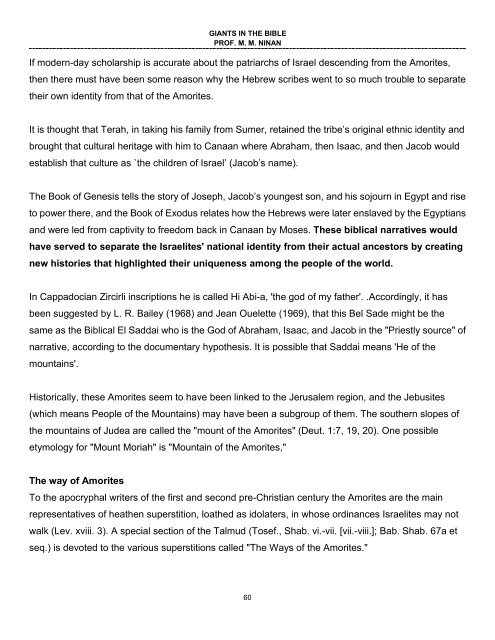Giants_in_the_Bible
Nephilims were on the earth, before and after the flood. Who are these giants? Were there other giant tribes and nations on the earth. How did they happen? A scriptural review on giants on earth.
Nephilims were on the earth, before and after the flood. Who are these giants? Were there other giant tribes and nations on the earth. How did they happen? A scriptural review on giants on earth.
You also want an ePaper? Increase the reach of your titles
YUMPU automatically turns print PDFs into web optimized ePapers that Google loves.
GIANTS IN THE BIBLE<br />
PROF. M. M. NINAN<br />
If modern-day scholarship is accurate about <strong>the</strong> patriarchs of Israel descend<strong>in</strong>g from <strong>the</strong> Amorites,<br />
<strong>the</strong>n <strong>the</strong>re must have been some reason why <strong>the</strong> Hebrew scribes went to so much trouble to separate<br />
<strong>the</strong>ir own identity from that of <strong>the</strong> Amorites.<br />
It is thought that Terah, <strong>in</strong> tak<strong>in</strong>g his family from Sumer, reta<strong>in</strong>ed <strong>the</strong> tribe’s orig<strong>in</strong>al ethnic identity and<br />
brought that cultural heritage with him to Canaan where Abraham, <strong>the</strong>n Isaac, and <strong>the</strong>n Jacob would<br />
establish that culture as `<strong>the</strong> children of Israel’ (Jacob’s name).<br />
The Book of Genesis tells <strong>the</strong> story of Joseph, Jacob’s youngest son, and his sojourn <strong>in</strong> Egypt and rise<br />
to power <strong>the</strong>re, and <strong>the</strong> Book of Exodus relates how <strong>the</strong> Hebrews were later enslaved by <strong>the</strong> Egyptians<br />
and were led from captivity to freedom back <strong>in</strong> Canaan by Moses. These biblical narratives would<br />
have served to separate <strong>the</strong> Israelites' national identity from <strong>the</strong>ir actual ancestors by creat<strong>in</strong>g<br />
new histories that highlighted <strong>the</strong>ir uniqueness among <strong>the</strong> people of <strong>the</strong> world.<br />
In Cappadocian Zircirli <strong>in</strong>scriptions he is called Hi Abi-a, '<strong>the</strong> god of my fa<strong>the</strong>r'. .Accord<strong>in</strong>gly, it has<br />
been suggested by L. R. Bailey (1968) and Jean Ouelette (1969), that this Bel Sade might be <strong>the</strong><br />
same as <strong>the</strong> Biblical El Saddai who is <strong>the</strong> God of Abraham, Isaac, and Jacob <strong>in</strong> <strong>the</strong> "Priestly source" of<br />
narrative, accord<strong>in</strong>g to <strong>the</strong> documentary hypo<strong>the</strong>sis. It is possible that Saddai means 'He of <strong>the</strong><br />
mounta<strong>in</strong>s'.<br />
Historically, <strong>the</strong>se Amorites seem to have been l<strong>in</strong>ked to <strong>the</strong> Jerusalem region, and <strong>the</strong> Jebusites<br />
(which means People of <strong>the</strong> Mounta<strong>in</strong>s) may have been a subgroup of <strong>the</strong>m. The sou<strong>the</strong>rn slopes of<br />
<strong>the</strong> mounta<strong>in</strong>s of Judea are called <strong>the</strong> "mount of <strong>the</strong> Amorites" (Deut. 1:7, 19, 20). One possible<br />
etymology for "Mount Moriah" is "Mounta<strong>in</strong> of <strong>the</strong> Amorites,"<br />
The way of Amorites<br />
To <strong>the</strong> apocryphal writers of <strong>the</strong> first and second pre-Christian century <strong>the</strong> Amorites are <strong>the</strong> ma<strong>in</strong><br />
representatives of hea<strong>the</strong>n superstition, loa<strong>the</strong>d as idolaters, <strong>in</strong> whose ord<strong>in</strong>ances Israelites may not<br />
walk (Lev. xviii. 3). A special section of <strong>the</strong> Talmud (Tosef., Shab. vi.-vii. [vii.-viii.]; Bab. Shab. 67a et<br />
seq.) is devoted to <strong>the</strong> various superstitions called "The Ways of <strong>the</strong> Amorites."<br />
60

















